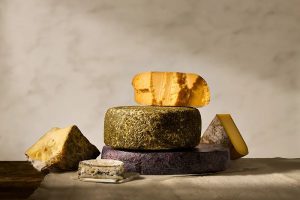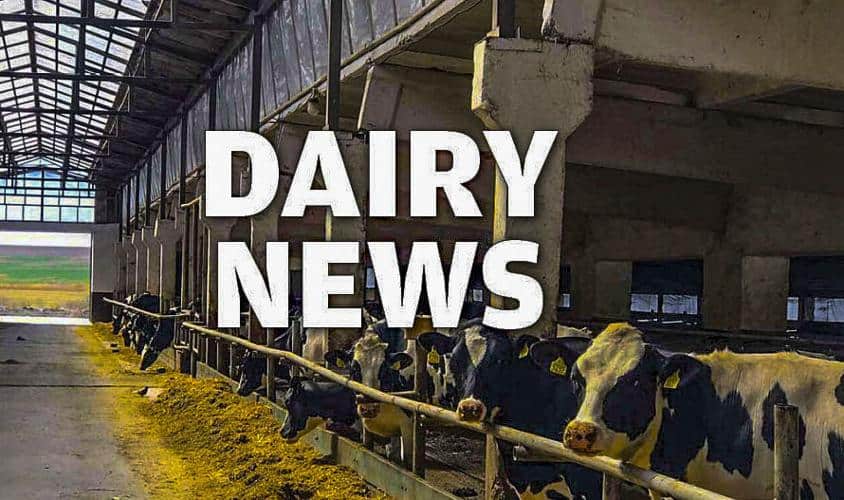Methane emissions reviewed


Methane emissions reviewed
Grazing dairy and livestock systems have been targeted as a source of enteric greenhouse-gas emissions. That’s primarily due to decreased forage quality that frequently results in increased enteric-methane emissions, according to a new study co-authored by Kathy Soder, an animal scientist at the U.S. Department of Agriculture’s Agricultural Research Service, and Andre Brito, an associate professor in agriculture, nutrition and food systems at the University of New Hampshire.
Compared with confinement operations where feeding rations and conditions are more controlled, grazing systems provide challenges due to lack of control of diet quality and difficulty in quantifying dry-matter intake and methane emissions of cows on pasture. There are also fewer options for mitigating methane emissions in grazing cows than in confined cows due to less control of the diet as well as potential milk markets such as grass-fed or organic that restrict supplementation strategies, the authors found.
They reviewed current and potential animal- and forage-management strategies to mitigate enteric-methane emissions that would be applicable to grazing systems. Many assessments of the impact of grazing-livestock systems don’t account for the ecosystem services provided by grazing systems which could offset much, if not all, of the enteric methane produced by grazing cows. Life-cycle assessments that account for the carbon flux of all inputs and outputs of grazing dairy systems are needed to fully assess overall environmental impact, the authors stated.
The study was published in Journal of Dairy Science. Visit jdscommun.org – search “emissions in grazing dairy” – for more information.
Grant applications sought
The Dairy Business Innovation Alliance is accepting applications beginning Aug. 21 for the Dairy Business Builder Grant Program and the Dairy Industry Impact Grant Program. The Dairy Business Innovation Alliance is a partnership between the Wisconsin Cheese Makers Association and the Center for Dairy Research.
The alliance develops and administers programs providing technical assistance as well as grants to dairy farms and businesses in Illinois, Iowa, Indiana, Kansas, Michigan, Minnesota, Missouri, Nebraska, Ohio, South Dakota and Wisconsin.
The Dairy Business Builder Grant Program aims to encourage small- to medium-sized dairy farmers, entrepreneurs and processors in the Midwest to pursue innovative projects such as dairy-farm diversification, on-farm processing, value-added product creation and efforts to market dairy products for export. Reimbursement grants of as much as $100,000 each will be awarded following a competitive review process.
The second program welcomes applications in targeted topic areas that have the potential to positively impact the dairy industry. Applications will be accepted for projects related to new or expanded dairy-export endeavors. The program also offers reimbursable grants of as much as $100,000 each, to be awarded following a competitive review process.
Applicants may apply for both grants if they have two separate projects related to Dairy Business Innovation Alliance goals.
Those interested in either grant program are encouraged to attend one of the upcoming free webinars. The webinars will review the application components, frequently asked questions and advice for a successful application.
The grant-application deadline is 5 p.m. Oct. 18. Applicants will be notified of results in early December. Visit cdr.wisc.edu/dbia for more information.
Young leaders sought
The Holstein Foundation’s Young Dairy Leaders Institute is currently accepting applications for Class 13. The program is open to young adults ages 22 to 45 working in any segment of the dairy industry.
The three-phase program focuses on strengthening young adults in the areas of growth mindset, team culture, advocacy, embracing change, community involvement and more. Phase I will be held from Jan. 28 to Feb. 1 in Tampa, Florida. During Phase II participants will complete self-driven projects in their local communities. Phase III will be held Jan. 26-30, 2025, again in Tampa, Florida.
The top applicants for Class 13 will be selected in October 2023. Those individuals will need to invest the time to complete projects throughout the year-long program. Much of the program is funded by the Holstein Foundation, but class members pay a registration fee, along with travel and hotel costs. Some scholarships are available for full-time dairy producers who apply.
Applications are due Sept. 15. Visit holsteinfoundation.org or email dharkenrider@holstein.com for more information.
Dairy Challenge elects leadership
The North American Intercollegiate Dairy Challenge recently elected new leadership, including three new board members. The board of directors is comprised of university professionals, dairy producers and industry sponsors. Newly elected to the 15-person volunteer board of directors are
• Matt Groen, Cargill, Guelph, Ontario, Canada, works in dairy technical services as a nutritionist for Cargill in Canada. He competed for the University of Guelph at the Dairy Challenge competition in 2011 in North Carolina. Since then he has been involved in helping coordinate the University of Guelph’s Dairy Challenge Course. He also has helped coach the University of Guelph Dairy Challenge team.
• Marilyn Schaap, Deer Creek Feeding LLC. Farwell, Texas, was raised on her family’s dairy farm in Tipton, California. She attended California Polytechnic State University where she participated in Dairy Challenge at the regional level and was a member of the university’s national team. She currently works as a controller for Deer Creek Feeding LLC.
• Erin Spangler, Riverview LLP, Morris, Minnesota, was raised on a dairy farm in northeastern Iowa. She has worked with Riverview for the past 11 years. She’s responsible for the coordination of safety audits, safety compliance and development and implementation of recruitment programs at farms in five states.
The North American Intercollegiate Dairy Challenge executive committee for 2023-2024 is comprised of
• Chairwoman – Dr. Cathy Myers, veterinarian, Amelicor, Fresno, California
• Vice-chairman – Alex White, Virginia Polytechnic Institute and State College, Blacksburg, Virginia
• Associate vice-chairman – Jeffrey Elliot, Balchem, Amarillo, Texas
• Finance chairman – Dave Thorbahn, Select Sires, Plain City, Ohio
• Programs and engagement chairwoman – Gail Carpenter, Iowa State University
• Program chairman – Ted Halbach, University of Wisconsin-Madison
The Dairy Challenge is an event for students in dairy programs at North American post-secondary institutions. Its mission is to develop tomorrow’s dairy leaders and enhance progress of the dairy industry by providing education, communication and networking among students, producers and agribusiness and university personnel. In addition to the national competition and Dairy Challenge Academy held each spring, four regional contests are held in late fall and winter. Visit dairychallenge.org for more information.
Legal notice about Intellectual Property in digital contents. All information contained in these pages that is NOT owned by eDairy News and is NOT considered “public domain” by legal regulations, are registered trademarks of their respective owners and recognized by our company as such. The publication on the eDairy News website is made for the purpose of gathering information, respecting the rules contained in the Berne Convention for the Protection of Literary and Artistic Works; in Law 11.723 and other applicable rules. Any claim arising from the information contained in the eDairy News website shall be subject to the jurisdiction of the Ordinary Courts of the First Judicial District of the Province of Córdoba, Argentina, with seat in the City of Córdoba, excluding any other jurisdiction, including the Federal.
1.
2.
3.
4.
5.
eDairy News Spanish
eDairy News PORTUGUESE
